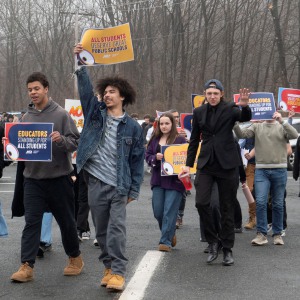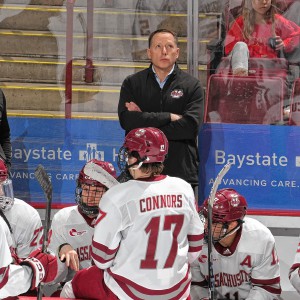Records detail money trails in Neal, Morse congressional race
| Published: 07-16-2020 2:08 PM |
HOLYOKE — Candidates running for the U.S. House seat in the 1st Congressional District filed campaign finance reports on Wednesday, offering the last look at their fundraising and spending before the Sept. 1 Democratic primary election.
The quarterly filings with the Federal Election Commission, or FEC, show that incumbent U.S. Rep. Richard Neal, D-Springfield, raised $336,920 during the period from April 1 to June 30, down from the almost $470,000 he raised in the first quarter of the year. Neal’s challenger, Holyoke Mayor Alex Morse, raised $321,927 this quarter, which is significantly higher than the $178,752 he raised during the first quarter of the year.
The vast majority of Neal’s second-quarter fundraising, 84%, came from political action committees, or PACs, which can give $5,000 per year to a candidate. Most of that money came from corporations and trade associations.
Nearly all of Morse’s fundraising came from individual donors, 95% of whom gave less than $200, according to the campaign. Of the $321,927 Morse raised, $3,500 came from other sources: a $2,000 donation from Jessica Cisneros for Congress, the political committee for the unsuccessful progressive challenger in Texas' 28th Congressional District this year, and $1,500 from Humanity Forward PAC, the organization spun out of the unsuccessful presidential campaign of Andrew Yang.
Neal ended the quarter with $4.2 million in cash on hand, whereas Morse had $315,212.
Neal continues to be a top fundraiser in the U.S. House. In particular, he has received more money from corporate PACs than all but one other member of the House — California Republican Kevin McCarthy, the House minority leader. Nearly 52% of the money Neal has raised this cycle has come from business PACs, according to the Center for Responsive Politics.
Among the PACs who have given the maximum $10,000 to Neal this election cycle are the tobacco company Altria Group, formerly known as Philip Morris; the American Bankers Association; the investment firm BlackRock; the alcohol giant Constellation Brands; the accounting firm Ernst & Young; General Electric; the for-profit health care facility operator HCA Healthcare; Insured Retirement Institute, a financial services trade association; several insurance companies, including John Hancock, Massachusetts Mutual and MetLife; the National Association of Insurance and Financial Advisors; the National Venture Capital Association; The Boeing Company; and Visa.
Morse’s fundraising received a big bump in the last week of the reporting period, according to his campaign, which said he raised around $110,000 in that week alone. The increase came after Jamaal Bowman, a progressive challenger to U.S. Rep. Eliot Engel in New York’s 16th Congressional District, endorsed Morse over social media on June 23. Bowman went on to win his race over Engel, a longtime incumbent who chaired the House Committee on Foreign Affairs.
Article continues after...
Yesterday's Most Read Articles
 Nearly all of South Hadley High’s student body holds ‘walkout to walk-in’ rally to oppose cuts, call for funding reform
Nearly all of South Hadley High’s student body holds ‘walkout to walk-in’ rally to oppose cuts, call for funding reform
 Northampton schools probe staff response to student’s unfulfilled IEP
Northampton schools probe staff response to student’s unfulfilled IEP
 Amherst’s Ryan Leonard makes NHL debut for Washington Capitals in 4-3 win over Bruins in Boston
Amherst’s Ryan Leonard makes NHL debut for Washington Capitals in 4-3 win over Bruins in Boston
 Belchertown voters to decide on $3.3M override for schools, town, capital projects
Belchertown voters to decide on $3.3M override for schools, town, capital projects
 Four Red Fire Farm workers arrested as part of ICE operation in Springfield
Four Red Fire Farm workers arrested as part of ICE operation in Springfield
 UMass hockey: Carvel reflects on Minutemen’s successful 2024-25 season
UMass hockey: Carvel reflects on Minutemen’s successful 2024-25 season
The filings also show how much money the candidates spent during the second quarter.
Morse spent $146,432, which is similar to the $159,468 he spent in the first quarter. Neal, meanwhile, spent $639,889 during the second quarter, a significant increase from the $424,949 he spent in the previous quarter.
Almost half of Neal’s spending was on advertising. The longtime incumbent spent close to $300,000 on ads and media during the quarter through the Northampton-based firm Horgan Associates.
Morse, for his part, didn’t spend any money on TV ads. The campaign did spend $24,909 on “digital consulting,” though, including $18,000 with the progressive media and fundraising firm Middle Seat Consulting. Morse has spent $10,647 on Facebook ads from May 1 to July 14, $4,243 of which was spent in the last week, according to the website's ad library.
There are also outside groups spending money on advertising in the race, recent FEC filings show.
The group Fight Corporate Monopolies — a nonprofit led by progressive political operatives and which, as a 501(c)(4), does not have to disclose its own donors — spent $150,000 on July 7 running ads against Neal. Those ads accuse Neal of having sided with his corporate backers over constituents. The group has pledged to spend $300,000 on anti-Neal ads.
Neal has previously been the beneficiary of outside ad spending. In January, for example, the American Hospital Association, which represents hospitals and health care providers, spent $69,487 on advertising supporting Neal, according to FEC filings.
Voters head to the polls on Sept. 1 to decide who will win in the Democratic primary. There are no Republicans running for the seat after Southwick businessman John Cain dropped out of the race to unsuccessfully run for state Senate in the 2nd Hampden and Hampshire District.
Hampshire County cities and towns in the 1st Congressional District are Easthampton, Chesterfield, Cummington, Goshen, Granby, Huntington, Middlefield, Plainfield, South Hadley, Southampton, Westhampton, Williamsburg and Worthington. The district also includes all of Berkshire County, all of Hampden County except for one precinct in Palmer, and parts of Franklin and Worcester counties.
Dusty Christensen can be reached at dchristensen@gazettenet.com.]]>






 Sabadosa, Velis push for state endometriosis task force to raise awareness about little-known illness
Sabadosa, Velis push for state endometriosis task force to raise awareness about little-known illness  Around the Hamptons: Four candidates advance for Easthampton police chief
Around the Hamptons: Four candidates advance for Easthampton police chief Having adapted over time, Whately Grange celebrating 85 years
Having adapted over time, Whately Grange celebrating 85 years Dash to the dealership?: Local consumers, car sellers brace for auto tariffs to kick in Wednesday
Dash to the dealership?: Local consumers, car sellers brace for auto tariffs to kick in Wednesday
